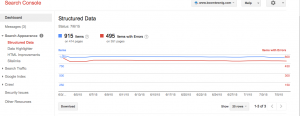Schema Penalties
Schema markup is a type of microdata that can improve your organic search visibility, as well as content discovery on search engines. Through the use of rich snippets, you can display content from your webpage in SERPs. The use of rich snippets is beneficial for SEO because it can make your webpage more enticing for users to visit. However, the schema markup can now have an adverse effect to your site. Google has begun issuing penalties for sites that improperly structured markup in a spammy way.
Sites that use schema incorrectly can now expect penalties from the search engine after Google’s update to its rating and reviews. Included in this update was a revision to the function of these snippets. No longer can they be placed on categories or list of items landing pages, to use schema properly by Google’s standard it must be placed on a specific item. Starting in March 2015, Google began to penalize sites that used Structured Data in ways that didn’t abide by their standards. These sites receive error messages in their Google Search Console reports that looked this like:
“Spammy structured markup
Markup on some pages on this site appears to use techniques such as marketing up content that is invisible to users, marking up irrelevant or misleading content, and/or other manipulative behavior that violates Google’s Rich Snippet Quality guidelines.”
How to Avoid Penalties
Be sure that your Structured Data is aligned with Google’s most recent guidelines and standards. Review Google’s policies on structured data here.
You can test your markup in Google’s Structured Data Testing Tool. This tool informs you of any errors so you can address them before you make your structured data live.
Google notifies you of a penalty in the Structured Data report in Google Search Console. Be sure to monitor your Search Console for any indexation errors.
Review Google’s Webmaster blog for updates or news on Structured data. http://googlewebmastercentral.blogspot.com/.



